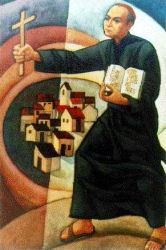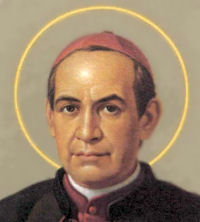Ordinary Time: October 24th
Monday of the Thirtieth Week in Ordinary Time; Optional Memorial of St. Anthony Claret, Bishop
» Enjoy our Liturgical Seasons series of e-books!
Today the Church celebrates the Optional Memorial of St. Anthony Claret (1807-1870), bishop, the founder of the Missionary Sons of the Immaculate Heart of Mary. Anthony Mary Claret died in the Cistercian monastery at Fontfroide in France on this date in 1870. He was canonized in 1950 and listed in the General Roman Calendar in 1960.
St. Anthony Mary Claret
 Anthony was born at Salent in the Diocese of Vich in Catalonia, Spain, in the year in which Napoleon invaded Spain. He was trained for manual labor, since his father was a weaver, but in 1829 he entered the seminary at Vich. Ordained to the priesthood in 1835, he was assigned as pastor in his home parish. Later he went to Rome to work for the Propagation of the Faith. He also entered the novitiate of the Jesuits but had to leave because of ill health, so he returned to Spain and was assigned as pastor of a parish. His apostolate consisted of rural preaching, conferences for the clergy and publications (he wrote more than 150 books). Because of his successful apostolate he aroused the animosity of some of the clergy and as a result he left Catalonia for the Canary Islands (1848). After a year he returned to Catalonia and resumed his preaching apostolate.
Anthony was born at Salent in the Diocese of Vich in Catalonia, Spain, in the year in which Napoleon invaded Spain. He was trained for manual labor, since his father was a weaver, but in 1829 he entered the seminary at Vich. Ordained to the priesthood in 1835, he was assigned as pastor in his home parish. Later he went to Rome to work for the Propagation of the Faith. He also entered the novitiate of the Jesuits but had to leave because of ill health, so he returned to Spain and was assigned as pastor of a parish. His apostolate consisted of rural preaching, conferences for the clergy and publications (he wrote more than 150 books). Because of his successful apostolate he aroused the animosity of some of the clergy and as a result he left Catalonia for the Canary Islands (1848). After a year he returned to Catalonia and resumed his preaching apostolate.
In 1849 Anthony gathered together five priests who formed the basis of the Missionary Sons of the Immaculate Heart of Mary (popularly known as Claretians). At the suggestion of the Queen of Spain, Isabella II, Anthony was named archbishop of Santiago, Cuba (1850). For the next seven years he made pastoral visitations, preached against the slavery of the Negroes, and regularized numerous marriages. As a result of his activity he was frequently threatened with death and on one occasion an attempt was actually made on his life. In 1857 he was recalled to Spain as confessor to the queen. In this way he was able to exert some influence in the naming of bishops, set up a center of ecclesiastical studies at the Escorial, and work towards the recognition of religious orders in Spain. In 1869 he was in Rome, preparing for the First Vatican Council. He followed Isabella II into exile and at the insistence of the Spanish ambassador, was placed under house arrest in the Cistercian monastery at Fontfroide, where he died at the age of 63. His remains were ultimately returned to Vich.
—Excerpted from Saints of the Roman Calendar by Enzo Lodi
Patronage: Catholic press; Claretians; Missionary Sons of the Immaculate Heart of Mary; weavers; savings banks; foundations
Highlights and Things to Do:
- Read more about the life of St. Anthony Mary Claret:
- Read the The Autobiography of St. Anthony Mary Claret: Priest, missionary, archbishop, and founder of the Congregation of Missionaries, Sons of the Immaculate Heart of Mary and read his own words.
- St. Anthony was interested in the Catholic press, and the Claretians continue the publishing apostolate. Every Catholic home should have a healthy collection of good Catholic books, both for young and old, and these should be read and displayed prominently.
- St. Anthony spoke at Vatican Council I. Learn more about this Church council and its teaching on papal infallibility in particular.
- Catholic Cuisine has a Cuban meal for a feast day suggestion.






